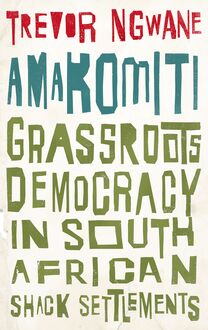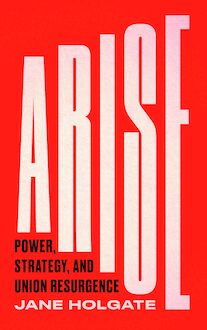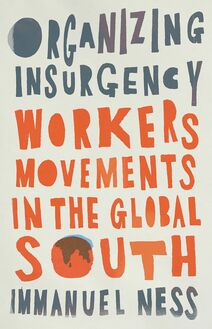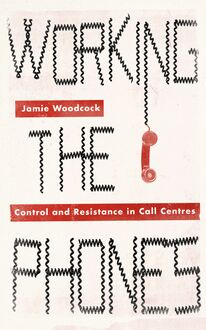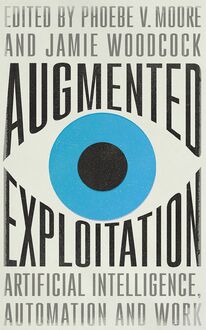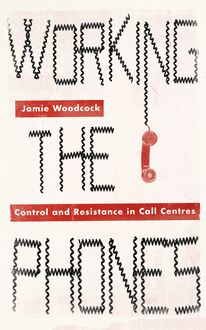Working the Phones , livre ebook
98
pages
English
Ebooks
2016
Vous pourrez modifier la taille du texte de cet ouvrage
Obtenez un accès à la bibliothèque pour le consulter en ligne En savoir plus
Découvre YouScribe en t'inscrivant gratuitement
Découvre YouScribe en t'inscrivant gratuitement
98
pages
English
Ebooks
2016
Vous pourrez modifier la taille du texte de cet ouvrage
Obtenez un accès à la bibliothèque pour le consulter en ligne En savoir plus
Publié par
Date de parution
20 novembre 2016
Nombre de lectures
0
EAN13
9781786800152
Langue
English
*Shortlisted for the BBC Radio 4 Thinking Allowed Award for Ethnography 2017*
*Winner of the 2016 Labor History Best Book prize*
Over a million people in the UK work in call centres, and the phrase has become synonymous with low-paid and high stress work, dictatorial supervisors and an enforced dearth of union organisation. However, rarely does the public have access to the true picture of what goes on in these institutions.
For Working the Phones, Jamie Woodcock worked undercover in a call centre to gather insights into the everyday experiences of call centre workers. He shows how this work has become emblematic of the shift towards a post-industrial service economy, and all the issues that this produces, such as the destruction of a unionised work force, isolation and alienation, loss of agency and, ominously, the proliferation of surveillance and control which affects mental and physical well being of the workers.
By applying a sophisticated, radical analysis to a thoroughly international 21st century phenomenon, Working the Phones presents a window onto the methods of resistance that are developing on our office floors, and considers whether there is any hope left for the modern worker today.
Acknowledgements
1. Introduction
2. Working in the Call Centre
3. Management
4. Moments of Resistance
5. Precarious Organisation
6. Conclusion
Notes
References
Index
Publié par
Date de parution
20 novembre 2016
Nombre de lectures
0
EAN13
9781786800152
Langue
English
Working the Phones
Wildcat: Workers’ Movements and Global Capitalism
Series Editors: Peter Alexander (University of Johannesburg) Immanuel Ness (City University of New York) Tim Pringle (SOAS, University of London) Malehoko Tshoaedi (University of Pretoria)
Workers’ movements are a common and recurring feature in contemporary capitalism. The same militancy that inspired the mass labour movements of the twentieth century continues to define worker struggles that proliferate throughout the world today.
For more than a century labour unions have mobilised to represent the political-economic interests of workers by uncovering the abuses of capitalism, establishing wage standards, improving oppressive working conditions, and bargaining with employers and the state. Since the 1970s, organised labour has declined in size and influence as the global power and influence of capital has expanded dramatically. The world over, existing unions are in a condition of fracture and turbulence in response to neoliberalism, financialisation and the reappearance of rapacious forms of imperialism. New and modernised unions are adapting to conditions and creating class-conscious workers’ movement rooted in militancy and solidarity. Ironically, while the power of organised labour contracts, working-class militancy and resistance persists and is growing in the Global South.
Wildcat publishes ambitious and innovative works on the history and political economy of workers’ movements and is a forum for debate on pivotal movements and labour struggles. The series applies a broad definition of the labour movement to include workers in and out of unions, and seeks works that examine proletarianisation and class formation; mass production; gender, affective and reproductive labour; imperialism and workers; syndicalism and independent unions, and labour and Leftist social and political movements.
Also available:
Just Work? Migrant Workers’ Struggles Today Edited by Aziz Choudry and Mondli Hlatshwayo
Southern Insurgency: The Coming of the Global Working Class Immanuel Ness
The Spirit of Marikana: The Rise of Insurgent Trade Unionism in South Africa Luke Sinwell with Siphiwe Mbatha
Working the Phones
Control and Resistance in Call Centres
Jamie Woodcock
First published 2017 by Pluto Press 345 Archway Road, London N6 5AA
www.plutobooks.com
Copyright © Jamie Woodcock 2017
The right of Jamie Woodcock to be identified as the author of this work has been asserted by him in accordance with the Copyright, Designs and Patents Act 1988.
British Library Cataloguing in Publication Data A catalogue record for this book is available from the British Library
ISBN 978 0 7453 9908 9 Hardback ISBN 978 0 7453 9906 5 Paperback ISBN 978 1 7868 0014 5 PDF eBook ISBN 978 1 7868 0016 9 Kindle eBook ISBN 978 1 7868 0015 2 EPUB eBook
This book is printed on paper suitable for recycling and made from fully managed and sustained forest sources. Logging, pulping and manufacturing processes are expected to conform to the environmental standards of the country of origin.
Typeset by Stanford DTP Services, Northampton, England
Simultaneously printed in the United Kingdom and United States of America
CONTENTS
Acknowledgements
1. Introduction
2. Working in the Call Centre
3. Management
4. Moments of Resistance
5. Precarious Organisation
6. Conclusion
Notes
References
Index
ACKNOWLEDGEMENTS
I would like to start by thanking my partner Maev, without whose support this book could never have been completed. I am grateful too for the support of my parents. My PhD supervisors Bev Skeggs and Alberto Toscano provided encouragement and insightful feedback throughout the project, as did my examiners Gregory Schwartz and Adam Hanieh. I would also like to thank Søren Goard for the discussions throughout the project and comments on the manuscript. The process of converting the PhD research into a book was greatly supported by David Shulman and the rest of the team at Pluto. Finally, I would like to thank all of the workers I met during the research.
Jamie Woodcock
1
INTRODUCTION
The Call Centre is a television series which highlights a number of key themes that will be discussed in this book. 1 The publicity for The Call Centre describes it as a ‘fly-on-the wall documentary series following the ups and downs of Swansea call centre CEO Nev Wilshire and his staff of extraordinary characters’. The first episode introduces the call centre with the narrator describing how ‘over 1 million people now work in UK call centres with an average age of just 26. They are the factories of our time. But here at the 3rd largest call centre in Swansea the only thing being made are the cold calls we dread’. The camera pans over a familiar scene: row upon row of desks with workers speaking through headsets, supervisors at the end of each row, and whiteboards scrawled with targets. In contrast, Martin Scorsese’s film The Wolf of Wall Street 2 might not at first glance seem to have as much to say about call centres. However, the protagonist Jordan Belfort starts working on the phones, sells penny stocks from a call centre, and his own company even starts with telesales. In particular the film highlights the sales ethos that permeates high-volume sales call centres. The documentary and the film are, of course, clearly designed for entertainment, rather than being a critical inquiry into the conditions of work. However, they illustrate a number of issues that offer insight into the experience of work and tie into the construction of negative views of call centres.
The CEO of the company, Nev Wilshire, is introduced in the first episode of The Call Centre . The narrator explains how Nev ‘has developed a unique approach to keeping his young workforce on their toes’. The camera cuts to Nev: a man in his fifties with receding hair, wearing a suit with a loosened tie. He says: ‘What sums up my management style? Hmm …’. The camera cuts to a shot of Nev standing on a table shouting at a worker, then to Nev leading a training session. Nev shouts: ‘Are you yawning at the back? Get down!’. He then proceeds to throw a board marker at the worker in question, which hits the wall above them. The camera cuts back to Nev describing his management style, concluding that his inspiration is ‘probably Napoleon … a dictator’, followed by a shot of Nev summarily sacking a worker. Nev returns to his analogy to explain that ‘his troops loved him’, while the camera moves to a shot of a worker saying ‘he’s awful, absolutely awful’, and another of a worker pretending to hang herself with the cord from a headset. 3 This kind of management approach is often seen in representations of call centres in popular culture. For example, in The Wolf of Wall Street , when Belfort starts working on the phones, his first interaction begins with a manager telling him, ‘You are lower than pond scum. You got a problem with that?’ Jordan is taken over to the rows of phones as the manager explains, ‘Your job is connector which means that you will be dialling the phone over five hundred times a day, trying to connect me with wealthy business owners and until you pass your series seven, that is all you’re going to fucking be doing. Sit! Sit!’. 4
The ‘frontier of control’ in the call centre seems firmly in the hands of management. 5 There is, unsurprisingly, no mention of trade unions or organised struggle in the call centre. Nev’s self-confessed management style not only alludes to factory despotism, but even involves an approving reference to an actual historical despot. This pop-cultural glimpse into the experience of the call centre floor provides a dim view of the potential for class struggle, offering only an opportunity for amusement. The narrator summarises this at one point as the camera pans across the office: ‘With a sales floor simmering with stress, sex, and success … there’s never a dull day when you work at this Swansea call centre.’ The camera moves back to show a bland industrial park, nondescript buildings with rows of parked cars. As the shot continues back to include roundabouts and grass verges, it is easy to think that this could be anywhere in the country.
The emotional dimension of working in a call centre is on display during a scene in which Nev meets a new batch of trainees. Nev, speaking to a room of new workers, explains that ‘happy people sell, miserable bastards don’t. Isn’t that right?! Happy people sing don’t they?! It lifts your spirits. You don’t sing sat on your arse, you sing standing up to project your voice’. The projector lights up with a karaoke style display and Nev signals to start: ‘Ok – Mr Brightside, the Killers, C sharp! Here we go – on your feet!’. The trainees look embarrassed – both in front of the camera and at the prospect of singing – while Nev pushes on: ‘Now we go for this – no messing!’. And in a mixture of different tones, abilities and levels of commitment, the music starts playing and the whole room begin to sing:
I’m coming out of my cage / And I’ve been doing just fine / Gotta gotta be down / Because I want it all / It started out with a kiss / How did it all end up like this? / It was only a kiss / It was only a kiss … 6
This is the first indication of the specific challenges of the indeterminacy of labour power (the difficulty faced when buying workers’ time: although a capitalist may have purchased a worker’s labour power by employing them, gaining the maximum benefit from this is not straightforward) in relation to the labour process in the call centre. The embarrassed workers are being forced to sing karaoke because, as Nev puts it, ‘it is a challenge to motivate seven hundred people’. Again Nev’s despotic management style is illustrated as he claims: ‘I would sack somebody for not singing – I have sacked somebody – two people – for not singing. We have a motto here: happy people sell.’ Similarly, Belfort’s first taste

